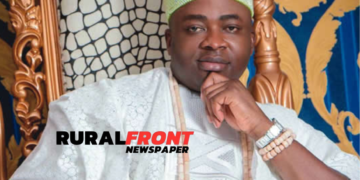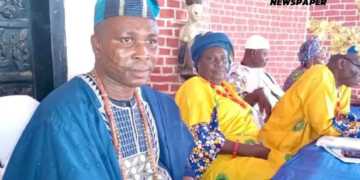NIGERIA’s musical roots are as deep as the Niger River, with a rich mix of sounds and traditions shaping its lively cultural scene. At the heart of this musical journey is Afrobeat, a genre born from the revolutionary spirit of the iconic Fela Kuti.
Imagine the essence of Afrobeat during Fela Kuti’s era: traditional African beats mingling with jazz, funk, and highlife at a musical gathering where everyone speaks truth to power and champions social justice.
The rise of Nigerian music
Fast forward a few decades, and Fela Kuti’s legacy is still going strong. Enter the new wave of Nigerian artists like Burna Boy, Wizkid, Davido, and Tiwa Savage, who have taken the Afrobeat torch and run with it, mixing Afrobeat with modern sounds. They’ve created a fresh, dynamic musical vibe that is making the whole world dance.
But there’s more! Nigerian music is on the verge of a historic moment that could change its path on the global stage. A groundbreaking deal involving the Grammy Awards—the Oscars of the music world—is about to shine a spotlight so bright on Nigerian artists, even the sun might get jealous.
The Kigali Summit
Recently, in the bustling city of Kigali, Rwanda, a transformative Tuesday dawned that would echo through the halls of African music history. High above the rolling hills and vibrant streets of the Rwandan capital, musical masterminds and delegates from Nigeria, Kenya, Rwanda, South Africa, and beyond gathered at the prestigious Convention Centre.
This was no ordinary meeting; it was a harmonious blend of cultures, aspirations, and melodies, all united in a shared vision of propelling African music to the global forefront.
Notably present was Barrister Hannatu Musa Musawa, Nigeria’s Minister of Art, Culture, and the Creative Economy. The stage was set for a story of innovation, collaboration, and the dawn of a new era in the African music industry.
As the delegates settled into the grand hall, the air buzzed with anticipation and excitement. The roundtable meeting marked a significant milestone in the journey towards a pan-African music renaissance.
Each representative brought a unique perspective. From the pulsating beats of Nigerian Afrobeats to the soul-stirring rhythms of South African jazz, the diversity and richness of the continent’s musical heritage were on full display.
At the right moment, Barrister Hannatu Musa Musawa, a beacon of leadership in Nigeria’s art, cultural, and creative landscape, took to the podium, her words resonating with passion and purpose.
With her voice carrying the weight of a continent’s dreams and ambitions, she declared, “Africa is the future of the music industry boom. The music industry provides an alternative source of revenue for Nigeria as well as other African countries, thus reducing dependency on traditional sectors like oil.
“The Nigerian music industry is enjoyed across Africa and the globe, providing employment opportunities for millions of young people in Africa, while promoting African culture and generating foreign currency to the country’s GDP.”
With unwavering conviction, she outlined Nigeria’s bold vision of diversifying from oil to music, culture, and entertainment, projecting a staggering $100 billion revenue by the year 2030. The room erupted in applause, a crescendo of hope and possibility filling the space.
Plan for global expansion
The summit’s primary outcome was the establishment of a steering committee dedicated to advancing Africa’s creative industries. Led by the CEO of the Latin Recording Academy, Manuel Abud, and supported by representatives from Afrexim Bank and key figures from the Recording Academy, the committee’s mandate is to foster a pan-African vision for music.
By pooling together expertise, resources, and influence, the committee aims to tackle issues like intellectual property rights infringement and piracy, which have long plagued the creative industries in Africa. Moreover, the committee’s efforts to secure adequate funding for creative endeavors will provide a much-needed boost to aspiring artists and musicians across the continent.
Nigeria’s pivotal role in the music industry was highlighted during the summit, with Musawa, Nigeria’s pioneer minister of creative economy, acknowledging the transformative impact of Nigerian Afrobeat superstars on the global music landscape.
“The globalization and emergence of our Afrobeat superstars into global pop culture have brought the Grammys to Africa. I must salute our legends like Burna Boy, Wizkid, Don Jazzy, Dbanj, Davido, P-Square, 2Face, Asake, Tiwa Savage, and others too numerous to mention. Their successes have not only brought prestige to Nigeria but have also propelled the entire continent into the spotlight,” she noted.
Grammy awards deal
Meanwhile, in a groundbreaking announcement that shook the music world, the Recording Academy, the organizers of the Grammy Awards, revealed a transformative partnership with Nigeria and other African nations. This marks the beginning of a new era of musical collaboration and opportunity.
Harvey Mason Jr., the forward-thinking CEO of the Recording Academy, highlighted the importance of this historic initiative, stressing the significant impact it will have on African artists and the global music scene.
He stated, “Music is one of humanity’s greatest natural resources. It is essential that those who dedicate themselves to creating music have support, resources, and opportunities, regardless of where they come from.”
At the core of this partnership is a shared belief in the power of music as a universal language that transcends borders and connects hearts.
The Recording Academy’s dedication to nurturing and promoting musical excellence aligns perfectly with Africa’s rich tapestry of diverse musical traditions and vibrant creative expressions.
By forming strategic alliances and encouraging cross-cultural collaborations, the stage is set for African artists, especially Nigeria’s Afrobeat stars, to shine brightly on the global stage. They will captivate audiences worldwide with their unique voices and diverse stories.
Angelique Kidjo, a legendary figure in African music, added her voice to the discussion, saying, “The Recording Academy is stepping up its efforts to serve music people everywhere, and Africa is ready with open arms. We are a continent of music and young, passionate music makers.”
Through a series of joint programs and initiatives, the Recording Academy and its African partners are paving the way for a new generation of musical pioneers to emerge.
From mentorship programs that offer guidance and support to emerging artists, to collaborative projects that blend diverse musical influences and genres, the possibilities for creative innovation are endless.
As African creators seize the chance to amplify their voices and share their stories with the world, a wave of artistic brilliance is expected to sweep over the global music landscape, enriching it with fresh perspectives and dynamic sounds.
The peak of this transformative partnership is anticipated as African artists step onto the world stage, equipped with the support, resources, and opportunities they need to reach their full potential. With unprecedented access to global markets and audiences, these musical visionaries are set to leave a lasting mark on the international music scene, captivating listeners with their artistry and sparking a cultural renaissance that transcends geographical boundaries.
The impact on Nigeria
The collaboration between Nigeria and the Recording Academy marks a pivotal moment in the nation’s musical journey. By forming this partnership, Nigeria not only solidifies its position as a cultural powerhouse but also opens doors to new economic opportunities.
Hon. Ababu Namwamba, Kenya’s Minister of Sports and Culture, highlighted the broader impact. He said, “This is a historic opportunity to celebrate ‘Africanacity’ through artistic and cultural expression, while fostering innovation, creativity, fraternity, and solidarity for African peoples in Africa and beyond.”
Beyond the economic benefits, this collaboration holds the promise of fostering national reconciliation and unity through shared cultural expressions. In a country as diverse as Nigeria, music serves as a unifying force, transcending ethnic, religious, and social divides.
Under the leadership of President Asiwaju Bola Ahmed Tinubu, the Federal Government of Nigeria has pledged its unwavering support to nurture this partnership, creating an environment where creativity can thrive.
With the stage set for collaboration and innovation, Nigeria’s music industry stands ready to reach new heights of success. The synergy between local talent and global expertise promises to amplify the voices of Nigerian artists, increasing their impact on the world stage. As the industry grows, so do the prospects for economic growth, job creation, and the promotion of Nigeria’s rich cultural heritage.
A unified vision for African music
The Kigali summit concluded with a shared vision for the future of African music. The communique from the Pan-African Steering Committee encapsulated this vision, emphasizing the importance of global recognition, pan-African collaboration, supportive economic policies, and the protection of intellectual property rights.
As John Legend aptly put it, “Music knows no borders. It’s global and transcends cultural, political, and language barriers. I’m so glad that the Recording Academy, the leading organization serving music creators, is evolving to be a more global organization.”
With this historic Grammy Awards deal, Nigerian music stars are not just set to shine—they are poised to dominate the global music scene, carrying the vibrant spirit of Africa onto the world stage. So, get ready to groove because the beats from Nigeria are about to make the whole planet dance. And remember, when your feet start moving and you just can’t stop, you have Fela Kuti and his Afrobeat successors to thank for turning the world into one big, groovy dance floor.
























